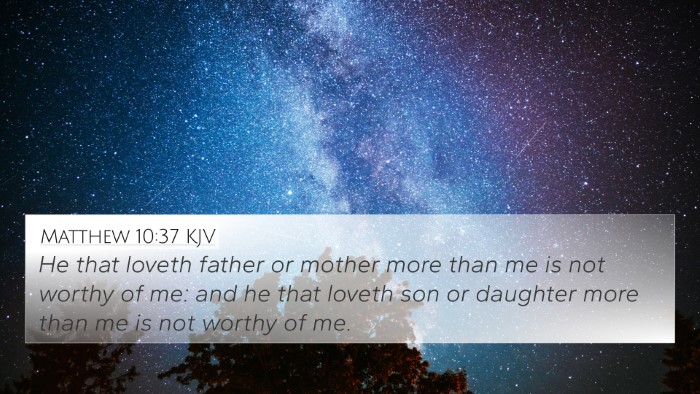Understanding Deuteronomy 6:5
Verse: "You shall love the LORD your God with all your heart and with all your soul and with all your might." (Deuteronomy 6:5, ESV)
Overview of Deuteronomy 6:5
Deuteronomy 6:5 stands as a cornerstone of Jewish faith and identity, summarizing the essence of the covenant relationship between God and His people. This verse calls for total devotion and love toward God, encompassing the heart, soul, and strength, which signifies complete commitment and obedience to God's commandments.
Commentary Insights
This verse has been widely commented upon by various biblical scholars, including Matthew Henry, Albert Barnes, and Adam Clarke. Below are the synthesized insights from these renowned commentaries:
-
Matthew Henry:
Henry describes this command as the greatest duty that a believer can fulfill. Loving God with all one's being signifies a love that is not only emotional but also intellectual and volitional. It is a call to continual devotion that requires individuals to prioritize their relationship with God above all else.
-
Albert Barnes:
Barnes remarks that this command emphasizes the totality of love; it demands our utmost devotion as seen in the three dimensions mentioned: heart, soul, and might. He points out that this reflects a covenant relationship where God should be loved supremely, paralleling the commitment found in marital vows.
-
Adam Clarke:
Clarke highlights the linguistic richness of the Hebrew terms used. He notes that 'heart' references the center of one's emotional and intellectual life, while 'soul' pertains to the entirety of life itself. The term 'might' suggests the use of all strength and resources. Clarke urges that this allegiance to God is both a personal mandate and a communal ethic.
Bible Cross-References
Deuteronomy 6:5 is interconnected with various verses throughout the Bible, revealing a comprehensive framework of Christian love and duty. Below are important cross-references:
- Matthew 22:37-38: Jesus reiterates this commandment as the greatest of all.
- Mark 12:30: Another account of Jesus affirming the need for loving God completely.
- Luke 10:27: The same command linked to the New Testament teaching of neighborly love.
- 1 John 4:19: Emphasizes the motive for love comes from God’s love for humanity.
- Joshua 22:5: Encourages the Israelites to love the Lord and serve Him with heart and soul.
- Romans 12:1: A call for believers to present their bodies as living sacrifices as an act of worship.
- Matthew 6:33: Prioritizing the kingdom of God as a manifestation of loving Him with all might.
Connections with Other Scriptures
When examining connections between Bible verses, Deuteronomy 6:5 serves as a key theological anchor for multiple themes:
- Thematic Unity: Loving God encompasses following His commandments (John 14:15).
- God’s Covenant: The call to love aligns with God's covenant promise (Exodus 20:6).
- Obedience as Expression of Love: Jesus said obedience is a manifestation of love (John 15:10).
Understanding Through Thematic Analysis
The cross-referencing of these themes can greatly deepen one’s understanding of the Bible’s message regarding love and devotion:
- Comparative Study: Analyzing the theme of love across different books such as the Pentateuch and Gospels.
- Inter-Biblical Dialogue: Connecting verses that highlight definitions of love, as seen in both Old and New Testaments.
- Comprehensive Reflection: Reflecting on how the themes of love, covenant, and holiness converge in scripture.
Tools for Bible Cross-Referencing
Utilizing tools like a Bible concordance or a comprehensive Bible cross-reference guide can greatly aid your study of related themes:
- Cross-reference Bible study: Learning methods to connect verses and concepts.
- Identifying Patterns: Noticing similar themes, such as love and obedience across scriptures.
- Research Techniques: Employing online and print resources for deeper thematic exploration.
Conclusion
Deuteronomy 6:5 is more than just a command; it encapsulates the essence of true worship and relationship with God. Engaging with this verse through cross-referencing and thematic analysis offers invaluable insights not only into the nature of love but also into the holistic commitment required from believers. As you explore the connections between this verse and others, may your understanding of the scriptural narrative deepen and your love for God grow ever more profound.















